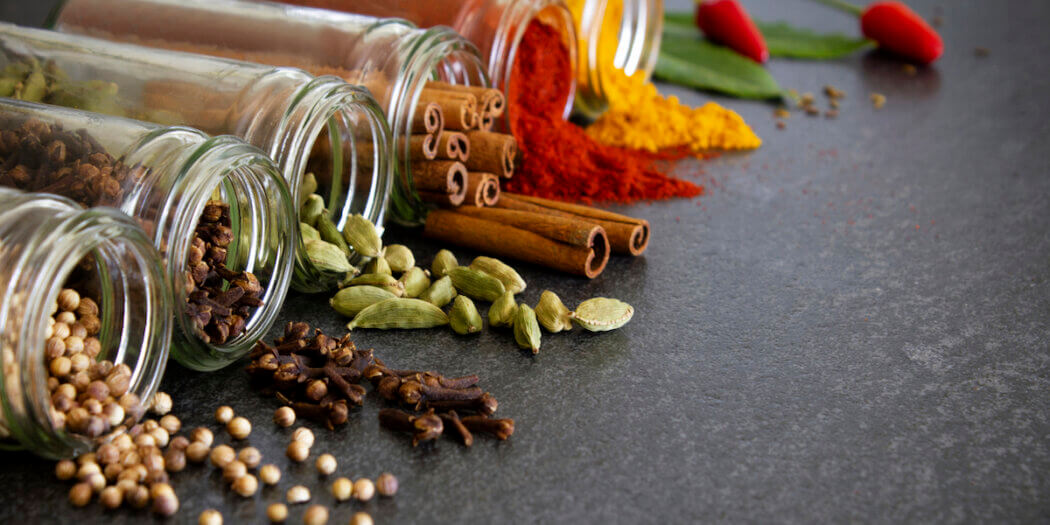Planning & Prep
Do Spices Go Bad? Guide To How Long Spices Will Last

If you’re like most people, you probably have a stash of spices in your cabinet that you’ve had for what seems like forever. While having a well-stocked selection of spices can help you create some pretty amazing meals, if you don’t use certain spices often, you might find yourself asking—“Do spices go bad?”
While spices don’t go “bad” in the same way that spoiled milk or moldy bread do, they do become less flavorful and may lose some of their benefits. So, while adding some of that years-old cumin to your food likely won’t make you sick, if you really want the spice to taste as intended, you’re better off getting rid of the old stuff and replacing it next time you need it.
How long do spices last?
The average shelf life for herbs and spices will depend on several factors including the type, how it’s processed, and how it’s stored. As a general rule, dried spices last longer than dried herbs, and the less processed a spice is, the longer of a self-life it will have. So, for example, if you’re asking yourself “Does cinnamon go bad quickly?”, you’ll have to consider whether you’re talking about the ground form or whole cinnamon sticks.
Want more information? Here’s a closer look at some of the most common categories of spices and their average shelf life.
Dried herbs
Most dried herbs will last between 1 and 3 years. This includes:
- Bay leaves
- Basil
- Cilantro
- Dill
- Mint
- Marjoram
- Oregano
- Parsley
- Rosemary
- Sage
- Thyme
Ground spices
Spices that are powdered or ground will usually last between 2 and 3 years. Some common examples include:
- Chili powder
- Crushed red pepper flakes
- Powdered ginger
- Garlic powder
- Seasoning blends
- Ground cinnamon
- Ground turmeric
- Ground allspice
- Ground paprika
- Ground cardamom
Whole spices
Since less of their surface area is exposed to air, whole (unground) spices have the longest shelf life. When stored properly, these spices can last as long as 4 years. Some examples include:
- Caraway seeds
- Cumin seeds
- Cloves
- Cinnamon sticks
- Coriander
- Mustard seeds
- Fennel seeds
- Lemongrass
- Whole peppercorns
- Whole dried chili peppers
- Whole nutmeg
Salt
Last, but certainly not least, salt is the one exception to the rule. This seasoning can be used indefinitely whether it’s whole or ground. Salt will never spoil or lose its flavor. However, seasoned salt may lose the added flavors over time.
How to maximize the shelf life of spices
To make sure your spices are as fresh and flavorful as possible, you’ll want to take care when selecting them and make sure to store them properly. The following tips will help guide your way.
1. Choose whole spices whenever possible
The longer ground spices are exposed to oxygen, the more flavor they’ll lose until they’re just a shadow of their former selves. Any time you have a choice, consider buying whole spices instead of their ground counterparts. Pick up a spice grinder, and you’ll be able to grind your whole spices to the consistency you want whenever you’re ready to use them.
2. Date and label your spices
While some brands of spices include a “best by” date, many do not, so it may not be helpful if you can’t remember when you bought them.
To prevent this, simply put a small piece of masking tape on the bottom of your spice bottle and use a marker to add the date that you bought it. This way, you can easily see which spices are past their prime and which ones you’ll want to use up soon.
3. Shop for spices with care
When shopping for spices, you’re better off buying them from a specialty market or spice store than from your corner deli. The more customers that are shopping for spices, the more often they’ll be rotated—which means you’ll get a fresher product.
Also, unless you’re planning to use up a container of spices in a couple of months, you’re better off buying the smallest container possible. This way, you won’t have a bunch of jars cluttering up your cabinets until it’s time to throw them away.
4. Store your spices properly
While many people store their spices above or next to the stove for convenience, this isn’t the best option. When they’re exposed to heat, light, and moisture, spices will begin to break down. If you want to maximize the shelf life of your spices, keep them in airtight containers store them in a cool, dry place.
It’s a good idea to keep spices in a drawer or cupboard to keep light exposure to a minimum. However, if you’re worried you might forget to use them if they’re out of sight, you can try keeping them out on the counter in amber glass jars with airtight lids instead.
How to tell if your spices have gone bad
Next time you find yourself asking “Does paprika go bad?” or wondering whether you’ve waited too long to use the cloves in your cupboard, start by taking a close look at the spice in question. It should look fresh, have a vibrant color, and be distinctly aromatic.
Open the jar and take a whiff. If you’re still not sure, try rubbing or crushing a small amount in the palm of your hand. If the color is faded, the scent is weak, or the flavor is lackluster, it’s time to toss the jar and pick up a new one.
Replenish your spice cabinet with ease
If it’s been a while since you’ve cleaned out your spices, you may find that many of them are past their prime. Don’t wait until you need a spice for a recipe to find out it’s not as flavorful as it should be.
Instacart makes it easy to replace expired items without ever leaving your home. Simply head over to Instacart.com, add all the spices you need to your shopping list, and let a professional shopper prepare your order. They’ll even bring your grocery delivery right to your door. Try it out today!
Most Recent in Planning & Prep

Planning & Prep
37 Care Package Ideas: From “Get Well” to “Just Because”
It’s always nice to show some extra appreciation for your loved ones. Whether you want to support a sick friend or a neighbor who had their first child, a care package is the perfect way…
Jan 30, 2025
Planning & Prep
Average Grocery Cost per Month: The 2025 Breakdown
The average grocery cost per month, per person, in the United States is roughly $350 for adults between 19 and 50 years old in a four-person household. This estimation depends on multiple factors, such as…
Dec 23, 2024
Planning & Prep
33 Shocking Global and National Food Waste Statistics (2025)
Did you know nearly 30% of the food produced globally is never eaten? This staggering food waste statistic highlights the alarming issue of uneaten food — a problem with environmental, economic and social consequences. Food…
Dec 23, 2024

 17 Grocery List Categories to Make Shopping Easy
17 Grocery List Categories to Make Shopping Easy  How to Meal Plan: Step-by-Step Guide to Meal Planning
How to Meal Plan: Step-by-Step Guide to Meal Planning  How To Read Food Labels: Guide to Nutrition Labels
How To Read Food Labels: Guide to Nutrition Labels 

